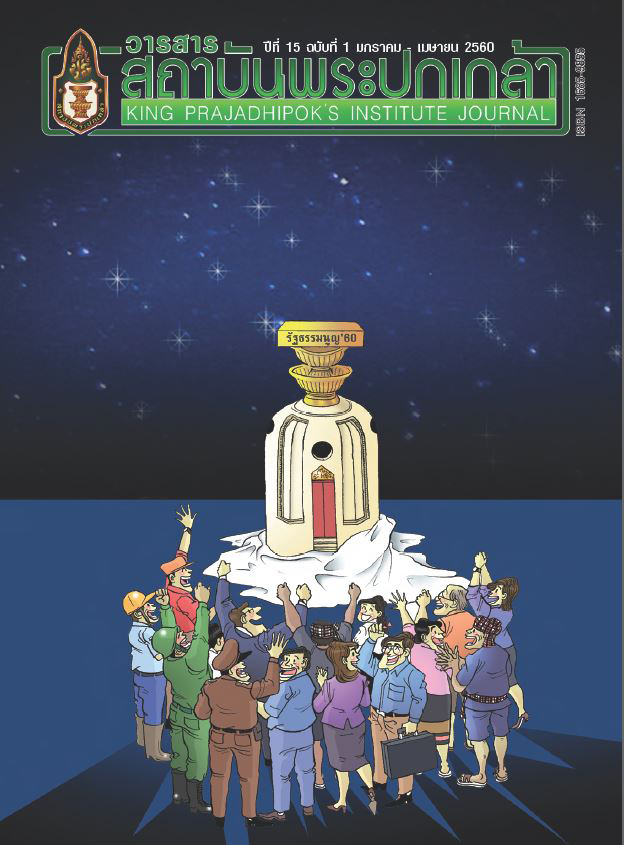Environmental Rights and Constitutional Reform in Thailand
Main Article Content
Abstract
Environmental rights in the constitutional law context has generated considerable public debate in Thailand. This is because Thailand is currently attempting to implement a new constitution in order to protect the rights of all Thais under the law of the land. The overall objective of this article is to provide a conceptual basis concerning the drafting of constitutional environmental provisions in Thailand. In essence, it aims to provide a more coherent framework for the constitutional
recognition of environmental rights, while at the same time satisfying norms of international environmental law. The recommendation proposes that reforms of the constitutional recognition of the right to environment are necessary in two areas. The first relates to the constitutional reform by adopting legal principles of previous Thai constitutions, new provisions for environmental rights in the Thai constitution (i.e. right to healthy environment, which was missing from the Thai 2550 Constitution), revoking some provisions, such as indigenous people’s rights, as well as internalizing founding principles of international environmental law into the Thai domestic legal framework. The second relates to the formulation of the courts’ working procedures on constitutional interpretation, thereby resolving problems of overlapping jurisdictions between the Constitutional Court and other judicial powers.
Article Details
@ 2020 King Prajadhipok's Institute The Government Complex Commemorating All Right Reserved.
References
จุมพต สายสุนทร. (2553). หนังสือสัญญาระหว่างประเทศที่ต้องได้รับความเห็นชอบจากรัฐสภา. กรุงเทพฯ: สำนักงานศาลรัฐธรรมนูญ.
ปวริศร เลิศธรรมเทวี. (2559). “พัฒนาการขององค์กรวินิจฉัยความชอบด้วยรัฐธรรมนูญไทย”. วารสารกฎหมายคณะนิติศาสตร์จุฬาลงกรณ์มหาวิทยาลัย. 34(1),177-201.
ปวริศร เลิศธรรมเทวี. (2559). ความรู้เกี่ยวกับกฎหมายทรัพย์สินทางปัญญา. กรุงเทพฯ: วิญญูชน.
ปวริศร เลิศธรรมเทวี. (2559). สิทธิด้านสิ่งแวดล้อมกับรัฐธรรมนูญ. กรุงเทพฯ: นิติธรรม.
ปวริศร เลิศธรรมเทวี. (2558). รัฐธรรมนูญกับการรับรองและคุ้มครองสิทธิขั้นพื้นฐานด้านสิ่งแวดล้อม กรุงเทพฯ: สำนักงานศาลรัฐธรรมนูญ.
ปวริศร เลิศธรรมเทวี. (2558) หลักและทฤษฎีสิ่งแวดล้อมในกฎหมายระหว่างประเทศ. วารสารนิติศาสตร์ มหาวิทยาลัยธรรมศาสตร์. 44 (2), 443-467.
ปวริศร เลิศธรรมเทวี. (2557). การรับรองสิทธิขั้นพื้นฐานด้านสิ่งแวดล้อมภายใต้รัฐธรรมนูญแห่งราชอาณาจักรไทย. ดุลพาห. 61(3), 1-45.
ปวริศร เลิศธรรมเทวี และ อัครวัฒน์ เลาวัณย์ศิริ. (2557) ผลกระทบต่อกระบวนการกฎหมายจากการเข้าเป็น
ประชาคมเศรษฐกิจอาเซียนของไทย. วารสารสถาบันพระปกเกล้า. 12(3), 21-38.
ปวริศร เลิศธรรมเทวี และ อัครวัฒน์ เลาวัณย์ศิริ. (2557). ประชาคมเศรษฐกิจอาเซียนกับระบบกฎหมายไทย. กรุงเทพฯ: วิญญูชน.
อุดมศักดิ์ สินธิพงษ์. (2556). กฎหมายเกี่ยวกับสิ่งแวดล้อม. กรุงเทพฯ: สำนักพิมพ์วิญญูชน.
อุดมศักดิ์ สินธิพงษ์. (2556). กฎหมายว่าด้วยความเสียหายทางสิ่งแวดล้อม: ความรับผิดทางแพ่ง การชดเชยเยียวยาและการระงับข้อพิพาท. กรุงเทพฯ: สำนักพิมพ์แห่งจุฬาลงกรณ์มหาวิทยาลัย.
อุดมศักดิ์ สินธิพงษ์. (2553). “รัฐธรรมนูญกับการคุ้มครองคุณภาพสิ่งแวดล้อม”. วารสารนักบริหาร, 30(3), 87, 87.
Cooley, T.M. (1927). A Treatise on the Constitutional Limitations which Rest Upon the Legislative Power of the States of the American Union. The Lawbook Exchange; Donald. T. Kramer (2004). As Self-Executing or Not Self-Executing. West Group,98-108; Nihal Jayawickrama. (2002). The Judicial Application of Human Rights Law: National, Regional and International Jurisprudence. New York: Cambridge University Press.
Pornsakol Panikabutara Coorey. (2008). The evolution of the rule of law in Thailand: The Thai constitutions. University of New South Wales Faculty of Law Research Series, Paper No. 45.
Boyd. D.R. (2012). The Right to a Healthy Environment. Vancouver and Toronto: UBC Press.
Hayward, T. (2004). Constitutional Environmental Rights. New York: Oxford University Press.
Laowonsiri, A, and Lertdhamtewe, P. (2553). “Overlapping Jurisdictions between WTO Dispute Settlement and Bilateral Mechanisms: Analysis of WTO DSB and Chile-USA FTA”. BU Academic Review. 7, 7.
Lertdhamtewe, P. (2014). “The Protection of Geographical Indications in Thailand”. Journal of World Intellectual Property. 17(3), 114-128.
Lertdhamtewe, P. (2014). Thailand’s sui generis system of plant variety protection. Geneva Quaker United Nations Office.
Lertdhamtewe, P. (2012). “Thailand’s plant protection regime: a case study in implementing TRIPS”. Journal of Intellectual Property Law and Practice. 7(3), 186-193.
Lertdhamtewe, P. (2009). An Analysis of ‘Amicus Curiae Briefs’ in the WTO Dispute Settlement Proceedings. Thailand Journal of Law and Policy. 12(2).
Mackenzie, R. (2005). “The Amicus Curiae in International Courts: Towards Common Procedural Approaches?”. In Tullio Treves et al (Eds). Civil Society, International Law and Compliance Bodies. 295, 295.
May, J.R., and Daly, E. (2014). Global Environmental Constitutionalism. New York: Cambridge University Press.
Sands, P. (2003). Principles of International Environmental Law. New York: Cambridge University Press.


